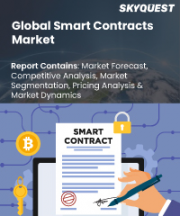
|
시장보고서
상품코드
1776742
스마트 계약 시장 예측(-2032년) : 계약 유형, 플랫폼, 블록체인 도입 모델, 기업 규모, 최종 사용자, 지역별 분석Smart Contracts Market Forecasts to 2032 - Global Analysis by Contract Type, Platform, Blockchain Deployment Model, Enterprise Size, End User and Geography |
||||||
Stratistics MRC에 따르면 세계의 스마트 계약 시장은 2025년 45억 달러를 차지하고 예측 기간 동안 CAGR 21.8%로 성장해 2032년까지 182억 달러에 이를 것으로 예측됩니다.
스마트 계약은 조건이 코드에 직접 쓰여지는 자체 실행형 디지털 계약입니다. 금융, 공급망 및 디지털 ID 분야에서 사용되는 스마트 계약은 지연을 줄이고 비용을 절감하고 당사자 간의 신뢰를 확보함으로써 현실 세계 거래를 자동화하는 강력한 도구입니다.
중앙은행의 디지털 통화와 암호에 관한 2023년 BIS 조사(BIS 페이퍼 No.147)에 따르면 조사 대상이 된 86개 중앙은행 중 94%가 2023년 말까지 CBDC를 적극적으로 검토하고 있습니다.
분산형 금융(DeFi) 성장
분산형 금융(DeFi)의 급속한 확장은 스마트 계약 시장의 주요 촉진요인입니다. 또한 투명성과 보안도 강화하고 있으며, 다양한 분야에서 DeFi 프로토콜의 채용이 증가하고 있는 것이 혁신적인 스마트 계약 솔루션 수요를 촉진하고 있으며, 진화하는 디지털 경제에 필수적인 인프라로 자리매김해 시장 전체의 성장을 가속화하고 있습니다.
확장성과 표준화 부족
블록체인 네트워크의 확장으로 인해 트랜잭션 처리량이 병목 현상이 발생하여 혼잡, 처리 시간 지연 및 수수료 상승으로 이어집니다. 이러한 과제는 특히 금융이나 헬스케어 등의 분야에서 스마트 계약가 대규모 기업 용도를 지원하는 능력을 제한하고, 그 결과 보다 광범위한 보급을 늦추고 장기적인 지속가능성에 대한 우려를 일으키고 있습니다.
새로운 산업과 이용 사례로 확대
스마트 계약 시장은 새로운 산업과 다양한 이용 사례로 확대를 통해 크게 성장하는 태세가 갖추어져 있습니다. 또한 블록체인이 IoT나 인공지능 등의 기술과 융합함으로써 자동화된 컴플라이언스와 리스크 관리 등의 혁신적인 용도의 가능성이 넓어지고 있습니다.
사이버 보안 위험과 악용
스마트 계약은 주로 로직 결함, 정수 오버플로우, 재진입 공격 등 코드 내 취약성으로 인한 사이버 보안 위험 증가에 직면하고 있습니다. 이러한 악용은 위협 행위자가 거래를 조작하고, 자금을 유출시키고, 업무를 방해하는 데 활용할 수 있습니다. 스마트 계약의 불변적인 특성은 배치된 결함의 영향을 증폭시켜 악용을 위한 영구 진입점이 됩니다. 분산형 용도가 확대됨에 따라 공격자는 플래시 론 공격과 오라클 조작 등의 첨단 기술을 개발하고 있으며, 금융 안정성과 블록체인 기반 생태계에 대한 신뢰에 심각한 위협을 가져오고 있습니다.
COVID-19의 영향:
COVID-19의 대유행은 스마트 계약 시장에 긍정적인 영향을 주었고 업계 전반의 디지털 변환을 가속화했습니다. 기업이 혁신에 직면하고 비접촉식 솔루션을 요구하게 되면 블록체인 기반 자동화 채택이 증가했습니다. 스마트 계약은 특히 분산 금융 및 공급망 관리에서 안전하고 투명한 자동 거래를 가능하게 했습니다. 게다가 원격 근무와 온라인 결제로의 전환은 변조 방지와 신뢰할 수 있는 계약의 필요성을 높이고, 유행 중 및 유통 후 스마트 계약 제공에 대한 투자와 혁신을 더욱 강화했습니다.
예측 기간 동안 DApp 코어 로직 계약 부문이 최대화될 전망
DApp 코어 로직 계약 부문은 예측 기간 동안 가장 큰 시장 점유율을 차지할 것으로 예측됩니다. 비즈니스 로직의 안전하고 자동화된 실행을 촉진하여 원활한 사용자 경험과 견고한 트랜잭션 처리를 가능하게 합니다.
예측 기간 동안 하이브리드 블록체인 부문의 CAGR이 가장 높을 것으로 예상
예측 기간 동안 하이브리드 블록체인 부문이 가장 높은 성장률을 보일 것으로 예측됩니다. 하이브리드 아키텍처의 채용이 진행됨으로써, 새로운 비즈니스 모델이나 이업종 콜라보레이션이 가능하게 되어, 스마트 계약의 전개에 있어서의 혁신이 촉진됩니다.
최대 점유율을 차지하는 지역
예측 기간 동안 북미는 고도의 디지털 인프라, 기술 선도적인 강력한 존재, 유리한 규제 환경에 견인되어 최대 시장 점유율을 차지할 것으로 예측됩니다. 게다가, 정부의 지원책과 성숙한 금융 섹터에 의해 금융, 헬스케어, 공급 체인 관리 등의 업계 전체에서 스마트 계약의 통합이 가속하고 있습니다.
CAGR이 가장 높은 지역:
예측 기간 동안 아시아태평양은 급속한 디지털화, 핀테크 에코시스템 확대, 신흥국의 블록체인 채용 증가로 가장 높은 CAGR을 나타낼 것으로 예측됩니다. 또한, 이 지역의 수많은 인구와 효율적이고 안전한 디지털 서비스에 대한 수요 증가가 다양한 분야에서의 스마트 계약 솔루션의 도입을 촉진하고 있습니다.
사용자 정의 무료 제공
이 보고서를 구독한 고객은 다음 무료 맞춤설정 옵션 중 하나를 받을 수 있습니다.
- 기업 프로파일
- 추가 시장 기업의 종합적 프로파일링(3개사까지)
- 주요 기업의 SWOT 분석(3개사까지)
- 지역 세분화
- 고객의 관심에 응한 주요국 시장 추계, 예측 및 CAGR(주: 타당성 확인에 따름)
- 경쟁 벤치마킹
- 제품 포트폴리오, 지리적 존재, 전략적 제휴에 기반한 주요 기업 벤치마킹
목차
제1장 주요 요약
제2장 서문
- 개요
- 이해관계자
- 조사 범위
- 조사 방법
- 데이터 마이닝
- 데이터 분석
- 데이터 검증
- 조사 접근
- 조사 자료
- 1차 조사 자료
- 2차 조사 정보원
- 전제조건
제3장 시장 동향 분석
- 성장 촉진요인
- 억제요인
- 기회
- 위협
- 최종 사용자 분석
- 신흥 시장
- COVID-19의 영향
제4장 Porter's Five Forces 분석
- 공급기업의 협상력
- 구매자의 협상력
- 대체품의 위협
- 신규 참가업체의 위협
- 경쟁 기업간 경쟁 관계
제5장 세계의 스마트 계약 시장 : 계약 유형별
- 스마트 법률 계약
- 표준화된 법적 계약
- 맞춤형 법적 계약
- 분산형 자율조직(DAO)
- 투자 DAO
- 서비스 DAO
- 보조금 DAO
- DApp 코어 로직 계약
- 금융 프로토콜 계약
- 게임 로직 계약
- 아이덴티티 및 인증계약
- 공급망 및 물류 자동화 계약
- 기타 DApp 코어 로직
- 비대체성 토큰(NFT) 계약
- ERC-721 표준
- ERC-1155 표준
- 기타 NFT 표준
제6장 세계의 스마트 계약 시장 : 플랫폼별
- Ethereum
- Avalanche
- NEAR Protocol
- Rootstock(RSK)
- Cardano
- BNB Chain
- Solana
- Polkadot
- Hyperledger Fabric
- R3 Corda
- Quorum
- 기타 플랫폼
제7장 세계의 스마트 계약 시장 : 블록체인 도입 모델별
- 퍼블릭 블록체인
- 프라이빗 및 허가형 블록체인
- 하이브리드 블록체인
제8장 세계의 스마트 계약 시장 : 기업 규모별
- 중소기업
- 대기업
제9장 세계의 스마트 계약 시장 : 최종 사용자별
- 은행, 금융서비스 및 보험(BFSI)
- 공급망 및 물류
- 정부 및 공공 부문
- 헬스케어
- 소매 및 E커머스
- 미디어 및 엔터테인먼트
- 부동산
- 에너지 및 유틸리티
- IT 및 통신
- 기타 최종 사용자
제10장 세계의 스마트 계약 시장 : 지역별
- 북미
- 미국
- 캐나다
- 멕시코
- 유럽
- 독일
- 영국
- 이탈리아
- 프랑스
- 스페인
- 기타 유럽
- 아시아태평양
- 일본
- 중국
- 인도
- 호주
- 뉴질랜드
- 한국
- 기타 아시아태평양
- 남미
- 아르헨티나
- 브라질
- 칠레
- 기타 남미
- 중동 및 아프리카
- 사우디아라비아
- 아랍에미리트(UAE)
- 카타르
- 남아프리카
- 기타 중동 및 아프리카
제11장 주요 발전
- 계약, 파트너십, 협업, 합작투자
- 인수와 합병
- 신제품 발매
- 사업 확대
- 기타 주요 전략
제12장 기업 프로파일링
- International Business Machines Corporation(IBM)
- Microsoft Corporation
- Google LLC(Alphabet Inc.)
- Amazon Web Services, Inc.
- Oracle Corporation
- SAS Institute Inc.
- FICO(Fair Isaac Corporation)
- Moody's Analytics, Inc.
- S&P Global Inc.
- Palantir Technologies Inc.
- Deloitte Touche Tohmatsu Limited
- KPMG International Limited
- PwC(PricewaterhouseCoopers International Limited)
- Accenture plc
- Zest AI, Inc.
- Ayasdi AI LLC
- Riskified Ltd.
- Upstart Holdings, Inc.
According to Stratistics MRC, the Global Smart Contracts Market is accounted for $4.5 billion in 2025 and is expected to reach $18.2 billion by 2032 growing at a CAGR of 21.8% during the forecast period. Smart contracts are self-executing digital agreements where the terms are directly written into code. They automatically trigger actions when predefined conditions are met, eliminating intermediaries. Built on blockchain, they offer transparency, security, and efficiency. Used in finance, supply chains, and digital identity, smart contracts reduce delays, cut costs, and ensure trust between parties, making them a powerful tool for automating real-world transactions.
According to the 2023 BIS survey on central bank digital currencies and crypto (BIS Paper No. 147), 94% of the 86 surveyed central banks were actively exploring CBDCs by the end of 2023.
Market Dynamics:
Driver:
Growth of decentralized finance (DeFi)
The rapid expansion of decentralized finance (DeFi) is a primary driver for the smart contracts market. DeFi platforms leverage smart contracts to automate financial transactions, enabling peer-to-peer lending, trading, and asset management without intermediaries. This shift reduces operational costs and also enhances transparency and security for users. Furthermore, the increasing adoption of DeFi protocols across various sectors is fueling demand for innovative smart contract solutions, positioning them as essential infrastructure for the evolving digital economy and accelerating overall market growth.
Restraint:
Lack of scalability and standardization
Due to growing blockchain networks, transaction throughput becomes a bottleneck, leading to congestion, slower processing times, and higher fees. Moreover, the absence of universally accepted standards complicates interoperability between platforms and increases the risk of inconsistent implementations. These challenges limit the ability of smart contracts to support large-scale enterprise applications, especially in sectors like finance and healthcare, thereby slowing broader adoption and raising concerns about long-term sustainability.
Opportunity:
Expansion into new industries and use cases
The smart contracts market is poised for substantial growth through expansion into new industries and diverse use cases. Beyond financial services, sectors such as supply chain management, real estate, insurance, and healthcare are increasingly exploring smart contract integration to automate complex workflows and enhance operational efficiency. Moreover, the convergence of blockchain with technologies like IoT and artificial intelligence is unlocking innovative applications, such as automated compliance and risk management. This broadening scope is expected to drive significant investment and adoption, creating new avenues for market participants.
Threat:
Cybersecurity risks and exploits
Smart contracts face rising cybersecurity risks, primarily due to vulnerabilities in code such as logic flaws, integer overflows, and reentrancy attacks. These exploits can be leveraged by threat actors to manipulate transactions, drain funds, or disrupt operations. The immutable nature of smart contracts amplifies the impact of any deployed flaw, making them permanent entry points for exploitation. As decentralized applications expand, attackers are developing more advanced techniques, including flash loan attacks and oracle manipulation, posing significant threats to financial stability and trust in blockchain-based ecosystems.
Covid-19 Impact:
The Covid-19 pandemic had a positive impact on the smart contracts market, accelerating digital transformation across industries. As businesses faced disruptions and sought contactless solutions, the adoption of blockchain-based automation increased. Smart contracts enabled secure, transparent, and automatic transactions, especially in decentralized finance and supply chain management. Additionally, the shift to remote work and online payments heightened the need for tamper-evident and trustless agreements, further boosting investment and innovation in smart contract offerings during and after the pandemic.
The DApp core logic contracts segment is expected to be the largest during the forecast period
The DApp core logic contracts segment is expected to account for the largest market share during the forecast period. This dominance stems from the critical role these contracts play in powering decentralized applications (DApps), which are gaining traction across finance, gaming, and supply chain management. DApp core logic contracts facilitate secure, automated execution of business logic, enabling seamless user experiences and robust transaction processing. Furthermore, the growing ecosystem of developers and enterprises building on platforms like Ethereum is driving sustained demand for these foundational smart contract components.
The hybrid blockchains segment is expected to have the highest CAGR during the forecast period
Over the forecast period, the hybrid blockchains segment is predicted to witness the highest growth rate. Hybrid blockchains combine the strengths of public and private blockchains, offering both transparency and controlled access. This flexibility appeals to enterprises seeking to balance openness with regulatory compliance and data privacy. The rising adoption of hybrid architectures is enabling new business models and cross-industry collaborations, fostering innovation in smart contract deployment. As organizations increasingly prioritize scalability and interoperability, hybrid blockchains are set to drive rapid expansion.
Region with largest share:
During the forecast period, the North America region is expected to hold the largest market share, driven by its advanced digital infrastructure, strong presence of technology giants, and favorable regulatory environment. The region has witnessed early and widespread adoption of blockchain technology, with significant investments from both established enterprises and innovative startups. Additionally, supportive government initiatives and a mature financial sector have accelerated the integration of smart contracts across industries such as finance, healthcare, and supply chain management. This robust ecosystem positions North America as the dominant regional market for smart contracts.
Region with highest CAGR:
Over the forecast period, the Asia Pacific region is anticipated to exhibit the highest CAGR, fueled by rapid digitalization, expanding fintech ecosystems, and increasing blockchain adoption in emerging economies. Countries like China, India, and Singapore are investing heavily in blockchain research and development, fostering innovation and regulatory clarity. Moreover, the region's large population and growing demand for efficient, secure digital services are driving the uptake of smart contract solutions across various sectors. This dynamic landscape is expected to propel Asia Pacific to the forefront of market growth.
Key players in the market
Some of the key players in Smart Contracts Market include International Business Machines Corporation (IBM), Amazon Web Services, Inc., Oracle Corporation, Tata Consultancy Services Limited, Infosys Limited, Microsoft Corporation, Google LLC (Alphabet Inc.), ConsenSys Inc., Chainlink Labs, Inc., Hyperledger Foundation, R3 LLC, Blockstream Corporation Inc., OpenXcell Technolabs Pvt Ltd, ScienceSoft USA Corporation, Cygnet Infotech Pvt Ltd, Monax Industries Ltd, Icertis, Inc. and Stellar Development Foundation.
Key Developments:
In March 2025, Trend Micro has maintained a long-standing collaboration with IBM, spanning over twenty-five years. Over that period, technology trends have come and gone. The IBM Z and IBM LinuxONE and Trend Micro Deep Security continue as well-established products based on forward-moving technologies.
In November 2024, Thales, the leading global technology and security provider, today announces the availability of CipherTrust Transparent Encryption (CTE) through the CipherTrust Data Security Platform as-a-service. CTE is designed to provide transparent, high-performance encryption for complex environments without the need to modify applications or underlying infrastructure. In continuing to expand its cloud service offerings, Thales remains committed to providing customers with a choice in how they consume data security services to help achieve compliance and protect sensitive data wherever it resides.
In July 2024, Consensys announced a research agreement with Smart Transaction Corp (STXN), enabling STXN to investigate ways to further enhance the composability and utility of Ethereum transaction semantics. The research, which is separate from but complementary to MetaMask's Smart Transactions feature launched in May 2024, will be conducted by the STXN team and funded by Consensys.
Contract Types Covered:
- Smart Legal Contracts
- Decentralized Autonomous Organizations (DAO)
- DApp Core Logic Contracts
- Non-Fungible Token (NFT) Contracts
Platforms:
- Ethereum
- Avalanche
- NEAR Protocol
- Rootstock (RSK)
- Cardano
- BNB Chain
- Solana
- Polkadot
- Hyperledger Fabric
- R3 Corda
- Quorum
- Other Platforms
Blockchain Deployment Models Covered:
- Public Blockchains
- Private/Permissioned Blockchains
- Hybrid Blockchains
Enterprise Sizes Covered:
- Small and Medium-sized Enterprises (SMEs)
- Large Enterprises
End Users Covered:
- Banking, Financial Services, and Insurance (BFSI)
- Supply Chain & Logistics
- Government & Public Sector
- Healthcare
- Retail & E-commerce
- Media & Entertainment
- Real Estate
- Energy & Utilities
- IT & Telecom
- Other End Users
Regions Covered:
- North America
- US
- Canada
- Mexico
- Europe
- Germany
- UK
- Italy
- France
- Spain
- Rest of Europe
- Asia Pacific
- Japan
- China
- India
- Australia
- New Zealand
- South Korea
- Rest of Asia Pacific
- South America
- Argentina
- Brazil
- Chile
- Rest of South America
- Middle East & Africa
- Saudi Arabia
- UAE
- Qatar
- South Africa
- Rest of Middle East & Africa
What our report offers:
- Market share assessments for the regional and country-level segments
- Strategic recommendations for the new entrants
- Covers Market data for the years 2024, 2025, 2026, 2028, and 2032
- Market Trends (Drivers, Constraints, Opportunities, Threats, Challenges, Investment Opportunities, and recommendations)
- Strategic recommendations in key business segments based on the market estimations
- Competitive landscaping mapping the key common trends
- Company profiling with detailed strategies, financials, and recent developments
- Supply chain trends mapping the latest technological advancements
Free Customization Offerings:
All the customers of this report will be entitled to receive one of the following free customization options:
- Company Profiling
- Comprehensive profiling of additional market players (up to 3)
- SWOT Analysis of key players (up to 3)
- Regional Segmentation
- Market estimations, Forecasts and CAGR of any prominent country as per the client's interest (Note: Depends on feasibility check)
- Competitive Benchmarking
- Benchmarking of key players based on product portfolio, geographical presence, and strategic alliances
Table of Contents
1 Executive Summary
2 Preface
- 2.1 Abstract
- 2.2 Stake Holders
- 2.3 Research Scope
- 2.4 Research Methodology
- 2.4.1 Data Mining
- 2.4.2 Data Analysis
- 2.4.3 Data Validation
- 2.4.4 Research Approach
- 2.5 Research Sources
- 2.5.1 Primary Research Sources
- 2.5.2 Secondary Research Sources
- 2.5.3 Assumptions
3 Market Trend Analysis
- 3.1 Introduction
- 3.2 Drivers
- 3.3 Restraints
- 3.4 Opportunities
- 3.5 Threats
- 3.6 End User Analysis
- 3.7 Emerging Markets
- 3.8 Impact of Covid-19
4 Porters Five Force Analysis
- 4.1 Bargaining power of suppliers
- 4.2 Bargaining power of buyers
- 4.3 Threat of substitutes
- 4.4 Threat of new entrants
- 4.5 Competitive rivalry
5 Global Smart Contracts Market, By Contract Type
- 5.1 Introduction
- 5.2 Smart Legal Contracts
- 5.2.1 Standardized Legal Contracts
- 5.2.2 Customized Legal Contracts
- 5.3 Decentralized Autonomous Organizations (DAO)
- 5.3.1 Investment DAOs
- 5.3.2 Service DAOs
- 5.3.3 Grant DAOs
- 5.4 DApp Core Logic Contracts
- 5.4.1 Financial Protocol Contracts
- 5.4.2 Gaming Logic Contracts
- 5.4.3 Identity & Authentication Contracts
- 5.4.4 Supply Chain & Logistics Automation Contracts
- 5.4.5 Other DApp Core Logic
- 5.5 Non-Fungible Token (NFT) Contracts
- 5.5.1 ERC-721 Standard
- 5.5.2 ERC-1155 Standard
- 5.5.3 Other NFT Standards
6 Global Smart Contracts Market, By Platform
- 6.1 Introduction
- 6.2 Ethereum
- 6.3 Avalanche
- 6.4 NEAR Protocol
- 6.5 Rootstock (RSK)
- 6.6 Cardano
- 6.7 BNB Chain
- 6.8 Solana
- 6.9 Polkadot
- 6.10 Hyperledger Fabric
- 6.11 R3 Corda
- 6.12 Quorum
- 6.13 Other Platforms
7 Global Smart Contracts Market, By Blockchain Deployment Model
- 7.1 Introduction
- 7.2 Public Blockchains
- 7.3 Private/Permissioned Blockchains
- 7.4 Hybrid Blockchains
8 Global Smart Contracts Market, By Enterprise Size
- 8.1 Introduction
- 8.2 Small and Medium-sized Enterprises (SMEs)
- 8.3 Large Enterprises
9 Global Smart Contracts Market, By End User
- 9.1 Introduction
- 9.2 Banking, Financial Services, and Insurance (BFSI)
- 9.3 Supply Chain & Logistics
- 9.4 Government & Public Sector
- 9.5 Healthcare
- 9.6 Retail & E-commerce
- 9.7 Media & Entertainment
- 9.8 Real Estate
- 9.9 Energy & Utilities
- 9.10 IT & Telecom
- 9.11 Other End Users
10 Global Smart Contracts Market, By Geography
- 10.1 Introduction
- 10.2 North America
- 10.2.1 US
- 10.2.2 Canada
- 10.2.3 Mexico
- 10.3 Europe
- 10.3.1 Germany
- 10.3.2 UK
- 10.3.3 Italy
- 10.3.4 France
- 10.3.5 Spain
- 10.3.6 Rest of Europe
- 10.4 Asia Pacific
- 10.4.1 Japan
- 10.4.2 China
- 10.4.3 India
- 10.4.4 Australia
- 10.4.5 New Zealand
- 10.4.6 South Korea
- 10.4.7 Rest of Asia Pacific
- 10.5 South America
- 10.5.1 Argentina
- 10.5.2 Brazil
- 10.5.3 Chile
- 10.5.4 Rest of South America
- 10.6 Middle East & Africa
- 10.6.1 Saudi Arabia
- 10.6.2 UAE
- 10.6.3 Qatar
- 10.6.4 South Africa
- 10.6.5 Rest of Middle East & Africa
11 Key Developments
- 11.1 Agreements, Partnerships, Collaborations and Joint Ventures
- 11.2 Acquisitions & Mergers
- 11.3 New Product Launch
- 11.4 Expansions
- 11.5 Other Key Strategies
12 Company Profiling
- 12.1 International Business Machines Corporation (IBM)
- 12.2 Microsoft Corporation
- 12.3 Google LLC (Alphabet Inc.)
- 12.4 Amazon Web Services, Inc.
- 12.5 Oracle Corporation
- 12.6 SAS Institute Inc.
- 12.7 FICO (Fair Isaac Corporation)
- 12.8 Moody's Analytics, Inc.
- 12.9 S&P Global Inc.
- 12.10 Palantir Technologies Inc.
- 12.11 Deloitte Touche Tohmatsu Limited
- 12.12 KPMG International Limited
- 12.13 PwC (PricewaterhouseCoopers International Limited)
- 12.14 Accenture plc
- 12.15 Zest AI, Inc.
- 12.16 Ayasdi AI LLC
- 12.17 Riskified Ltd.
- 12.18 Upstart Holdings, Inc.



















